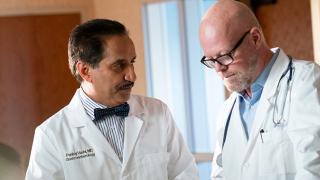Colorectal cancer is on the rise among younger adults across the United States. And in Illinois, both the overall rate of new colorectal cancer cases and the number of advanced-stage diagnoses are higher than the national average. Those are some of the major findings unearthed in the American Cancer Society’s (ACS) 2024 report.
What’s driving the numbers up? One of the key factors may be tied to changing trends in diet and nutrition, with Americans eating more highly processed foods than ever, according to Pankaj Vashi, M.D., vice chief of staff at City of Hope® Cancer Center Chicago.
“It’s been shown that fatty, greasy foods can be responsible for colon cancer,” Dr. Vashi says. “People who eat more fiber and a more balanced diet have less chance of developing colon polyps, which are the precursor to colorectal cancer.”
The good news: Early and frequent screening for colorectal cancer is an effective way to detect – and even prevent – the disease.
This article takes a deeper dive into the trends and potential causes, covering topics including:
- What is behind the increase in colorectal cancer rates?
- Colorectal cancer rates in communities of color
- Colorectal cancer screening is key
- At-home colorectal cancer screening
- Diagnosing colorectal cancer in Illinois
- Illinois colorectal cancer treatment
If you or a loved one has recently been diagnosed with colorectal cancer and are looking for a second opinion, call us 24/7 at (877) 524-4673.
What Is Behind the Increase in Colorectal Cancer Rates?
Many factors are considered when determining someone’s risk of developing colorectal cancer including:
- Family history of colorectal cancer or inflammatory bowel disease
- Inherited conditions like Lynch syndrome
- Excessive use of alcohol or tobacco
- Lack of physical activity
- Obesity or excess weight
The increase in cases of colorectal cancer over the past two decades has led to changes to recommendations for screening. Now, anyone with an average risk of the condition who is 45 or older should be screened regularly, according to the U.S. Preventive Services Task Force.

“Millennials are the people who are entering that age group,” Dr. Vashi says. “And we are finding out that they were raised with more fast foods and a less healthy and more sedentary lifestyle.”
As Americans have begun to eat more highly processed foods, obesity rates have soared to about 60 percent.
“Obesity is itself an indirect risk factor for colorectal cancer, so that contributes to finding more colorectal cancer in younger people, too” Dr. Vashi says.
Colorectal Cancer Rates in Communities of Color
Colorectal cancer diagnoses are also more common among Native, Black and Hispanic Americans than among white individuals, the ACS report found. This is not because of genetics, but linked to issues such as socioeconomic status and lack of access to adequate health care or insurance.
“If you look at who is getting screened, there is a big discrepancy between Caucasian people and African-American and Hispanic populations, specifically in inner city areas,” says Dr. Vashi, adding that about 65 percent of white Americans get screened regularly, compared to only 40 percent of Hispanic and African Americans.
In Illinois in particular, colorectal cancer rates are higher, especially in the Chicagoland area, primarily because these areas are home to more of the state’s underserved populations.
Colorectal Cancer Screening Is Key
Early detection drastically improves the chances of curing colorectal cancer. Colonoscopy – the standard screening for the disease – can even prevent cancer.
“With a colonoscopy, we can identify polyps, which are not cancer but precancerous lesions,” Dr. Vashi says. “And by taking them out, you reduce the chance that someone will develop colon cancer.”
The U.S. Preventive Task Force guidelines today recommend screening every three to five years for those aged over 45 with a normal risk of colorectal cancer. But patients with other conditions that affect the digestive system, such as Barrett’s esophagus or colon polyps, should talk to a specialist to determine their screening regimen.
At-home Colorectal Cancer Screening
Another option for colorectal cancer screening is the at-home test Cologuard®, which was approved for use in 2014 by the U.S. Food and Drug Administration. Cologuard works by looking for changes to the blood or DNA in a stool sample. It requires a doctor’s prescription and is only recommended for people at average risk of colorectal cancer.
While Dr. Vashi recommends colonoscopy as a first-line screening option, “for an average-risk person who cannot get access to a colonoscopy or is scared to get one done, I strongly recommend they use one of these non-invasive tests.”
Cologuard is about 90 percent effective in detecting precancerous DNA and is covered by most health insurance providers, including Medicare and Medicaid. In most cases, a positive result from a Cologuard test is followed up by a standard colonoscopy.
Diagnosing Colorectal Cancer in Illinois
While colonoscopy can be used to diagnose colorectal cancer, less invasive diagnostic methods are available. Some of the techniques used at City of Hope’s Lake County, Illinois, GI cancer center include:
- Endoscopic ultrasound, which involves using an endoscope (a thin lighted tube) combined with an ultrasound to look at the digestive system
- Stool tests, which look for certain indicators of cancer, like blood in the stool or changes to the body’s DNA
- Blood tests, which are not used to diagnose cancer alone, but can be used to confirm a diagnosis
“The most important thing is the stage at which you are diagnosed,” Dr. Vashi says. “If it’s stage 1 or 2, the disease can be managed with surgery, and stage 3 also has excellent outcomes with surgery and chemotherapy.” But with one in four people still being diagnosed at stage 4, it is vital to educate the public on the value of colorectal cancer screening, he says.
Illinois Colorectal Cancer Treatment
Though colorectal cancer rates have been increasing, the good news is that survival rates have continued to improve. Thanks to advances in treatment options, the five-year survival rate for colorectal cancer is about 65 percent.
“There are many targeted therapies that are getting approved that will mean more personalized treatment,” Dr. Vashi says.
Targeted therapies – which are designed to attack colorectal cancer on a cellular level – are a common approach at City of Hope, as are other leading-edge cancer care options such as minimally invasive surgeries and immunotherapy.
“There is no one-size-fits-all treatment plan, which is why it’s important we do genomic testing and create personalized treatment according to the targets that a patient has,” Dr. Vashi says. “Thankfully, we are seeing much better survival rates for colorectal cancer today than even 10 or 15 years ago.”
If you or a loved one has recently been diagnosed with colorectal cancer and are looking for a second opinion, call us 24/7 at (877) 524-4673.
